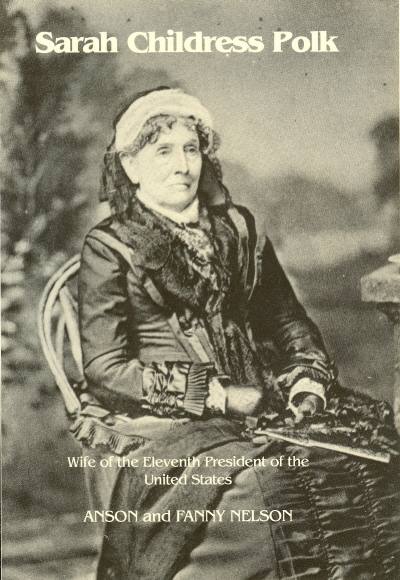MEMORIALS OF SARAH CHILDRESS POLK
by Anson & Fanny Nelson
ISBN 978-0-945707-07-3 $30.00
284 pages including nine pages of illustrations.
Originally published in 1892, MEMORIALS
OF SARAH CHILDRESS POLK is a broad sweeping tapestry of social history spanning
eight-eight years; from the dawning of the Republic, through the Silver
Age of American political history when Clay, Calhoun and Webster sparred
n the senate, to the Gilded Age that ushered out the 1800's. Sarah
Polk's story is told by Anson and Fanny Nelson who "...had abundant opportunity,
in the course of a long acquaintance, to observe minutely her life, character,
and methods of thought in weekly visits... Which for more than thirty years
were interrupted only by sickness or by occasional absence from the city,
together with free access to all the materials necessary to make up the
present narrative."
Sarah Childress was born in Rutherford County, Tennessee,
in September, 1803 of relatively prosperous parents and died in 1891; eighty-eight
years later, as one of Tennessee's most esteemed citizens.
James Knox Polk and Sarah Childress married in 1824.
For the next fifteen years his political fortunes soared. In 1825
he won a congressional seat and by 1835 he had become the Speaker of the
House. Returning to Tennessee, he own his first race for Governor in
1839 but lost two subsequent elections for the governor's mansion in 1841
and 1843. Having suffered two very visible defeats in his home state,
Polk's political career appeared to be at an end. And the, just when
things seemed darkest, he was nominated by the Democrats for the presidency.
In 1849, three months after leaving the White House, James
K. Polk died. Through the terms of his will, Sarah inherited everything
he owned including his Nashville estate, Polk Place, where she held court
alone for the next forty-two years. She remained secure in her tranquil
island as the Union and Confederate armies ebbed and flowed through Tennessee
during the civil War. The procession of visitors to Polk Place was
endless and her participation in various social and political outings was
exhaustive.
In 1891 Sarah Childress Polk died in her bed at Polk Place.



